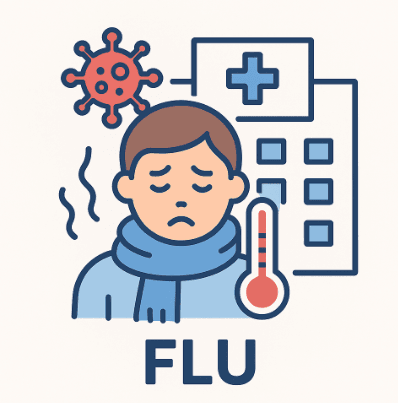What Causes It?
Influenza Virus Type A (most common, can cause pandemics)
Influenza Virus Type B (seasonal outbreaks)
Influenza Virus Type C (milder symptoms)
Direct Contact with infected individuals
Airborne Transmission via coughs and sneezes
Weakened immune system
Crowded public places during flu season
Poor respiratory hygiene
Signs & Symptoms
High fever (sudden onset)
Chills and shivering
Dry, persistent cough
Sore throat
Severe muscle and joint pain
Fatigue and weakness
Headache
Runny or stuffy nose
Loss of appetite
Nausea, vomiting, or diarrhea (more common in children)
